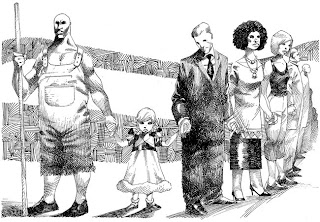
Pour commémorer ce qui serait son anniversaire de naissance, le New York Times produit un très beau texte sur le grand roman d'Harriet intitulé "La case de l'oncle Tom". Le roman paraît en 1852 et il aura d'importantes retombées aussi bien au nord qu'au sud juste avant la guerre de Sécession. Abraham Lincoln a déjà présente l'auteure comme étant "la petite dame responsable de la grande guerre".
Un extrait de l'article de ce matin:
"THE novelist Harriet Beecher Stowe, born 200 years ago today, was an unlikely fomenter of wars. Diminutive and dreamy-eyed, she was a harried housewife with six children, who suffered from various obscure illnesses worsened by her persistent hypochondria.
And yet, driven by a passionate hatred of slavery, she found time to write “Uncle Tom’s Cabin,” which became the most influential novel in American history and a catalyst for radical change both at home and abroad.
Today, of course, the book has a decidedly different reputation, thanks to the popular image of its titular character, Uncle Tom — whose name has become a byword for a spineless sellout, a black man who betrays his race.
And we tend to think of the novel itself as an old-fashioned, rather lachrymose affair that features the deaths of an obsequious enslaved black man and his blond, angelic child-friend, Little Eva.
But this view is egregiously inaccurate: the original Uncle Tom was physically strong and morally courageous, an inspiration for blacks and other oppressed people worldwide. In other words, Uncle Tom was anything but an “Uncle Tom.”
Indeed, that’s why in the mid-19th century Southerners savagely attacked “Uncle Tom’s Cabin” as a dangerously subversive book, while Northern reformers — especially blacks — often praised it. The ex-slave Frederick Douglass affirmed that no one had done more for the progress of African-Americans than Stowe.
The book was enormously popular in the North during the 1850s and helped solidify support behind the antislavery movement. As the black intellectual W. E. B. Du Bois later wrote, “Thus to a frail overburdened Yankee woman with a steadfast moral purpose we Americans, both black and white, owe our gratitude for the freedom and the union that exist today in these United States.”
The book stoked fires overseas, too. In Russia it influenced the 1861 emancipation of the serfs and later inspired Vladimir Lenin, who recalled it as his favorite book in childhood. It was the first American novel to be translated and published in China, and it fueled antislavery causes in Cuba and Brazil."
La suite:
http://www.nytimes.com/2011/06/14/opinion/14Reynolds.html?_r=1&nl=todaysheadlines&emc=tha212



Aucun commentaire:
Enregistrer un commentaire